Key takeaways:
- The coding community fosters inclusivity, mentorship, and a culture of continuous learning, enabling members to share knowledge and support each other.
- Collaboration in coding leads to innovative solutions and improved problem-solving, enriching the development process by incorporating diverse perspectives.
- Challenges such as burnout and rapid technological changes highlight the need for clear communication and supportive environments within development teams.
- Future coding communities are likely to embrace online collaboration, AI tools for mentorship, and specialized groups that empower diverse demographics.
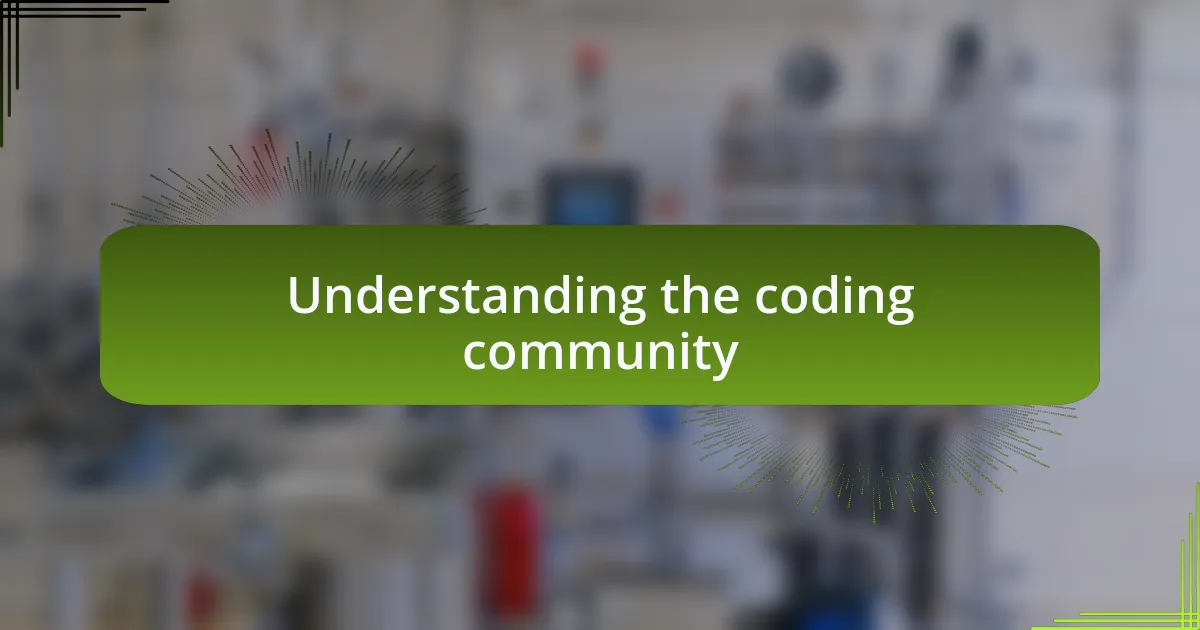
Understanding the coding community
The coding community is an intricate web of diverse individuals from all walks of life, united by a shared passion for technology. I remember my first encounter at a local hackathon. It was electrifying to see how quickly strangers turned into collaborators, fueled not just by ambition but by an eagerness to learn from one another. Have you ever felt that exhilarating rush when solving a complex problem alongside others? It’s a unique bonding experience, right?
As I’ve navigated this landscape, I’ve also observed that the coding community thrives on inclusivity and mentorship. I once had a mentor who took the time to explain concepts I found perplexing, transforming my confusion into clarity. This support system often prompts me to ask: how many budding coders might still be struggling without that kind of guidance? When you receive help, it’s hard not to feel a sense of obligation to pay it forward.
Moreover, the coding community is constantly evolving, mirroring the rapid advancements in technology. I’ve witnessed firsthand how new programming languages emerge and obsolete older ones, compelling us all to adapt. It raises an interesting thought: how do we keep ourselves relevant in such a fast-paced environment? Keeping a finger on the pulse of these changes fosters a culture of continuous learning and growth that I find incredibly motivating.
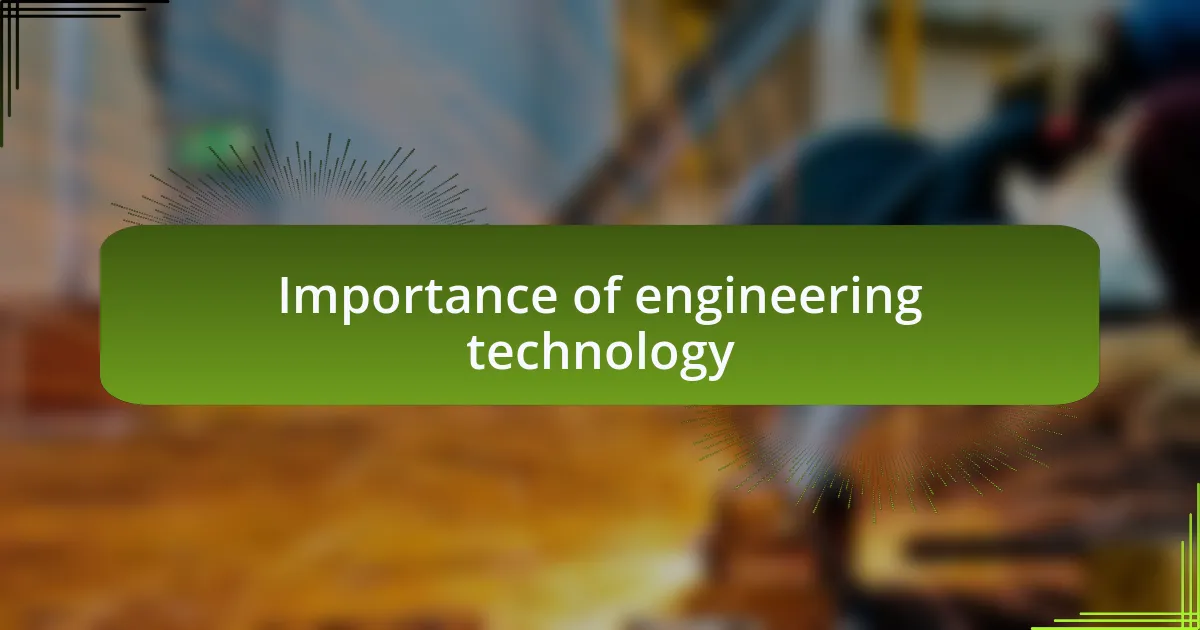
Importance of engineering technology
Engineering technology plays a pivotal role in shaping our lives and the world around us. Reflecting on my experiences, I recall a project where we redesigned a product to improve its efficiency. It was fascinating to see how a few tweaks in engineering led to substantial cost savings and a significant reduction in environmental impact. Can you imagine how many such innovations are born from engineering technology every day?
The beauty of engineering technology lies in its ability to solve real-world problems. I remember a time when I collaborated on a robotic system that assisted in disaster recovery efforts. Witnessing the direct impact of our engineering solutions on communities in need was incredibly fulfilling. Isn’t it inspiring to think how engineering can be a force for good, turning challenges into solutions that improve lives?
Moreover, engineering technology fosters collaboration across various disciplines. I’ve seen teams made up of engineers, designers, and even psychologists work together to create user-friendly systems. This interdisciplinary approach not only enriches the design process but also reflects the reality of today’s complex problems, prompting me to consider: how might we continue to forge connections across fields to drive innovation further?
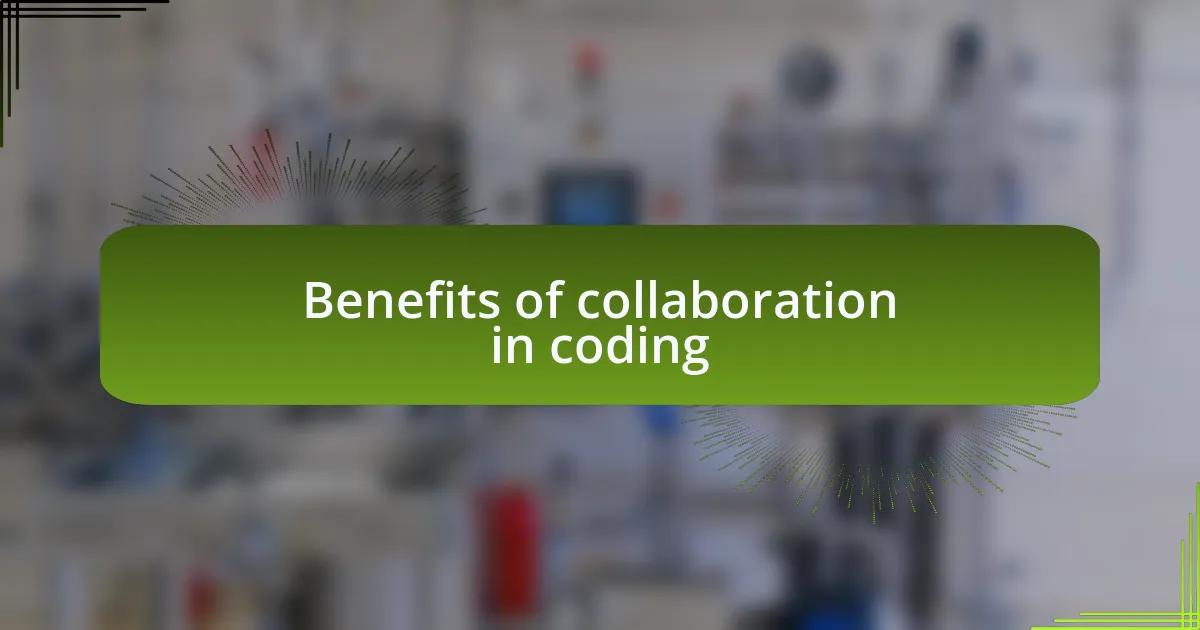
Benefits of collaboration in coding
Collaborating in coding opens the door to diverse perspectives that can elevate a project. I remember a coding marathon where my team included both seasoned developers and enthusiastic newcomers. The fresh ideas that emerged from the less experienced members invigorated our discussions and led us to explore solutions I hadn’t considered before. Have you ever experienced that moment when a simple suggestion shifts the entire project in a new direction?
When I’ve worked alongside others, I’ve realized how collaboration can lead to improved problem-solving. In one project, we encountered a complex bug that stumped many of us. But when we pooled our knowledge, two heads were better than one—as we dissected the problem, the solution became so much clearer. It made me wonder: how often do we overlook the power of teamwork when faced with challenges in coding?
Additionally, the sense of community that comes from collaboration is incredibly rewarding. There have been times when we celebrated small victories as a group, creating an atmosphere of camaraderie that drives us forward. That shared enthusiasm not only makes the arduous coding journey more enjoyable, but it also inspires a level of commitment I often find lacking in solitary work. Isn’t it fascinating how collaboration can transform a simple task into a fulfilling experience?
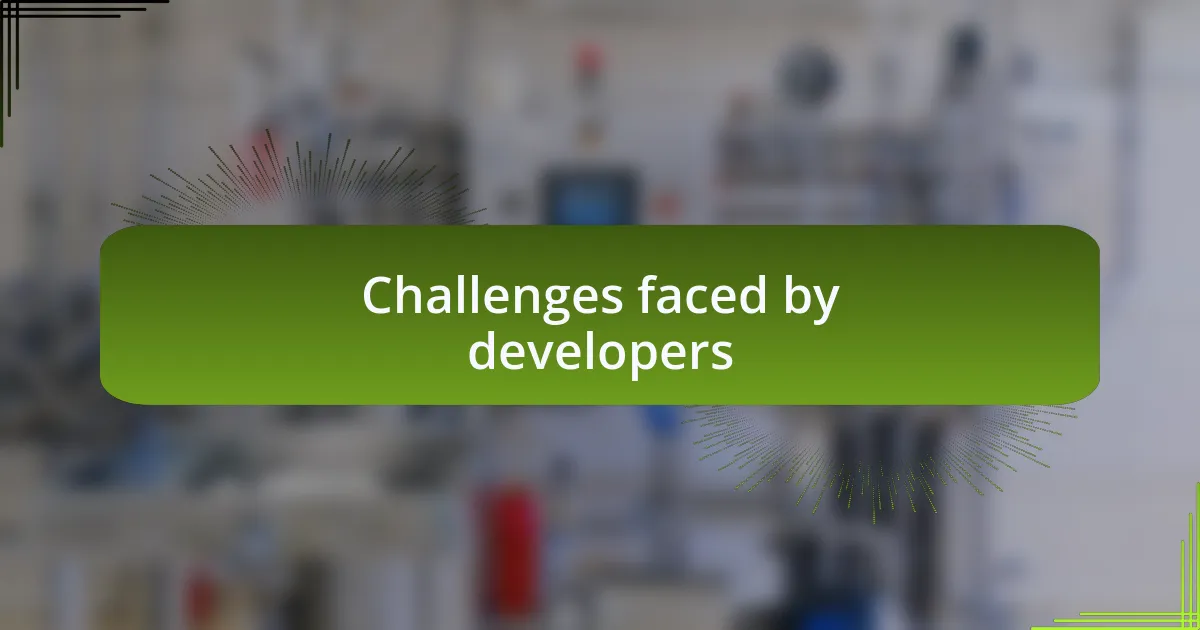
Challenges faced by developers
One of the biggest challenges developers often face is the issue of burnout. I vividly remember a project where the deadlines were relentlessly tight. The pressure was immense, and I found myself working late into the nights, sacrificing my personal time. Have you ever felt like you were running on fumes, yet pushing through just to meet expectations? It can be incredibly draining and often leads to a decline in productivity and creativity.
Another significant hurdle is keeping up with rapidly evolving technologies. I once dove deep into a new programming language that seemed essential for a project. Just as I was getting comfortable, a new framework emerged that promised even better results. It made me question: how can developers stay current without feeling overwhelmed? The fast-paced nature of tech means we’re always playing catch-up, which can be both exciting and daunting.
Additionally, communication can be a double-edged sword in development teams. I’ve sat in meetings where someone used jargon that completely lost me, leaving me feeling sidelined. It makes you wonder, how important is clear communication for a team’s success? I’ve learned that fostering an environment where everyone feels comfortable asking questions is vital. If we want to overcome challenges together, we need to ensure that our lines of communication stay open and inclusive.
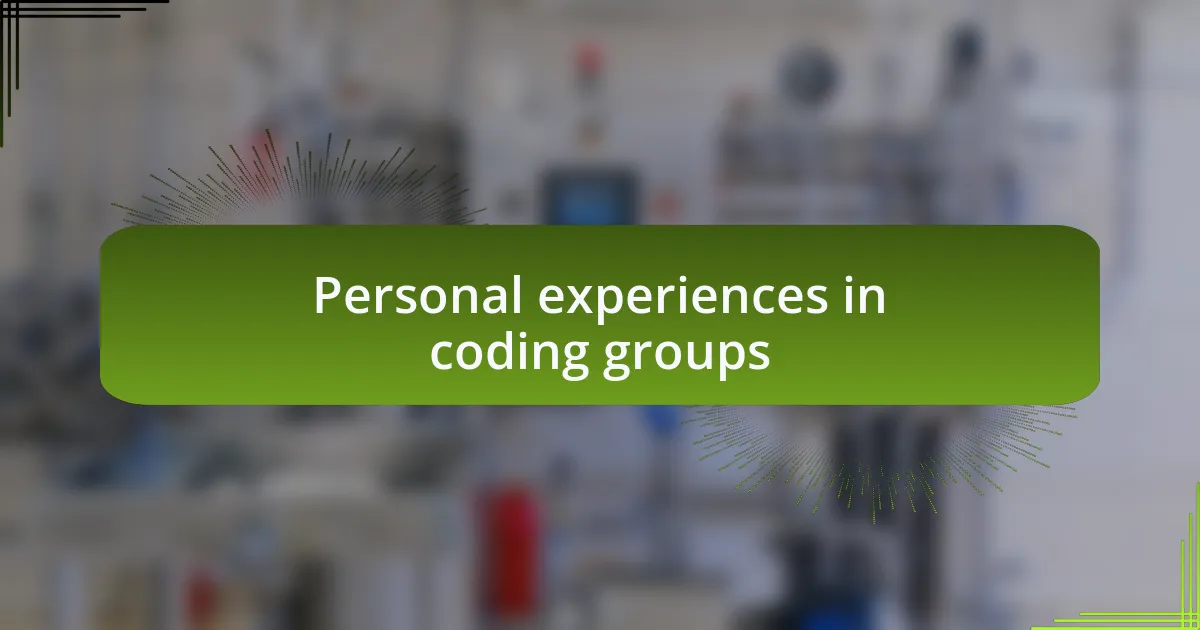
Personal experiences in coding groups
When I first joined a coding group, I experienced a mix of excitement and intimidation. The initial meetings felt overwhelming, filled with brilliant minds sharing their insights. I remember thinking, how do I fit in among such talent? Yet, as I engaged more with my peers, I discovered that vulnerability fostered connection. Sharing my struggles with a particularly tricky algorithm led to the most meaningful conversations and camaraderie.
One memorable experience was a late-night coding session with my group, fueled by caffeine and determination. As we tackled a complex project, we all faced moments of frustration. I distinctly recall a breakthrough moment when someone suggested an unconventional approach. It struck me then—collaboration can lead to innovative solutions that solitary work often misses. Have you ever felt that spark of creativity when bouncing ideas off others? It’s a reminder that diverse perspectives can enhance problem-solving.
In another group, we held a weekly “show and tell,” where anyone could present their projects or ideas. It was a space where creativity flourished, but I often hesitated to share my work at first, fearing judgment. Eventually, I realized that every project, no matter how small, had value. This practice not only built my confidence but also instilled a sense of community—knowing that everyone was rooting for one another’s success. Isn’t it amazing how collective support can shape our journeys?
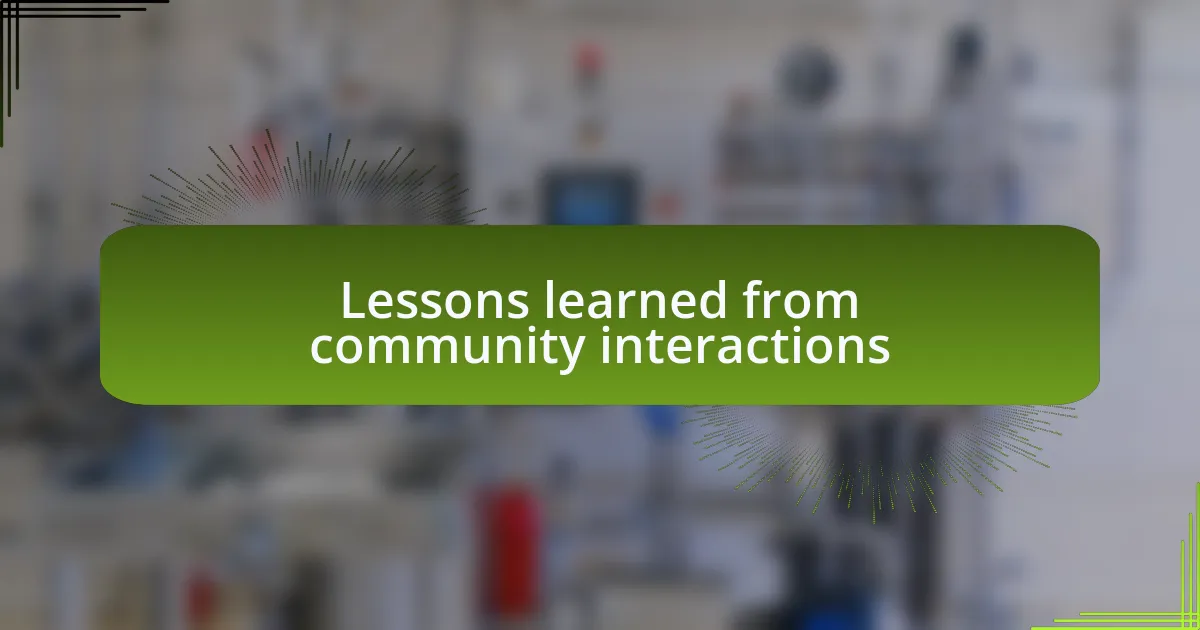
Lessons learned from community interactions
Engaging with the coding community has taught me that feedback can be a powerful tool for growth. I remember presenting a project I was passionate about, only to receive critiques that initially stung. However, reflecting on those comments helped me refine my approach and ultimately improve the project significantly. Have you ever found that constructive criticism from peers made you a better coder? It’s quite transformative.
One of the most important lessons I’ve learned is the value of patience in mentoring relationships. I had the chance to help a newcomer navigate their first coding challenge. Initially, I felt frustrated when they struggled with fundamental concepts. But it dawned on me that every expert was once a beginner. By taking the time to explain things in a supportive way, I not only reinforced my own understanding, but I also forged a genuine connection. Isn’t it rewarding when we can aid each other on our learning paths?
Moreover, I’ve discovered that vulnerability fosters deeper connections within the community. During a project setback, I shared my feelings of self-doubt with a small group. Instead of judgment, I was met with empathy and shared experiences. This transparency not only relieved my anxiety but also strengthened our bonds. How often do we overlook the power of simply being human with one another? It reminds us that we’re in this journey together, encouraging one another through the ups and downs.
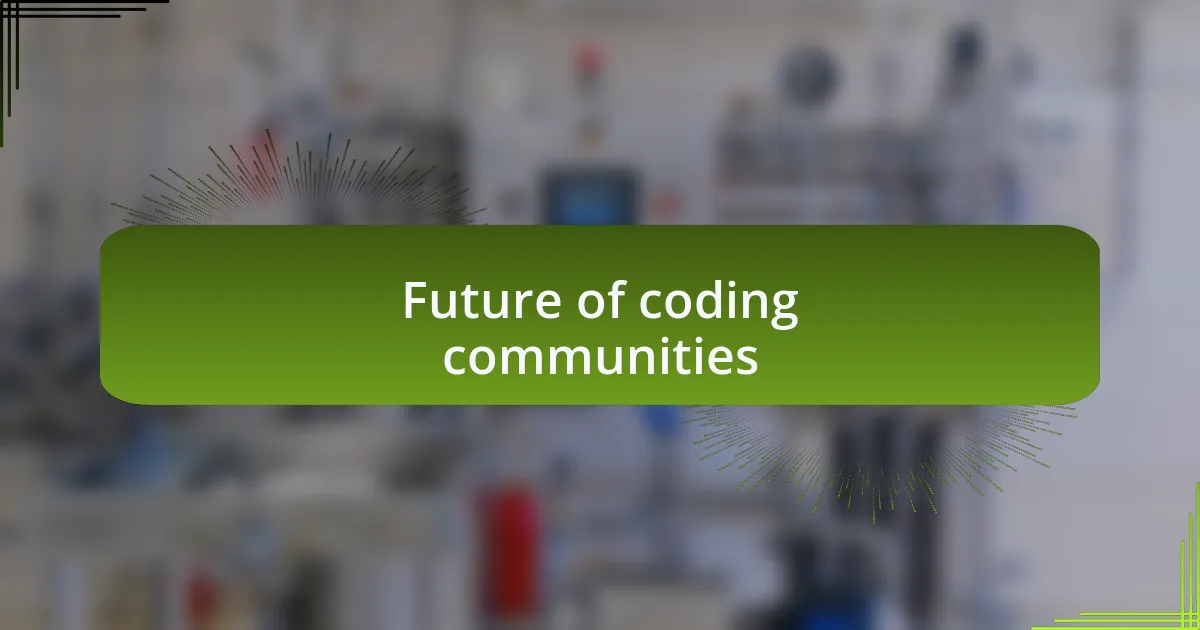
Future of coding communities
As I consider the future of coding communities, it’s evident to me that online collaboration will continue to evolve, shaping how we learn and grow as developers. I once attended a virtual hackathon where teams from different countries worked on the same project. The experience was electrifying, as we pooled our diverse skills and ideas in real-time. Can you imagine how powerful this global connectivity will become as technology advances?
Looking ahead, I believe that the integration of artificial intelligence and machine learning tools will transform mentorship dynamics within these communities. I recall using an AI code review tool that provided instant feedback and suggestions on my projects. It not only saved me time but also offered insights I hadn’t considered before. Won’t it be fascinating to see how such tools can make expert guidance more accessible to newcomers?
Furthermore, I foresee an increase in specialized coding communities that cater to specific technologies or demographics. I once joined a women’s coding group that created a safe space for sharing experiences and challenges. The support was palpable; we motivated each other to overcome obstacles in a male-dominated field. Isn’t it exciting to think about how these niche communities will continue to surface, fostering support and empowerment in diverse ways?